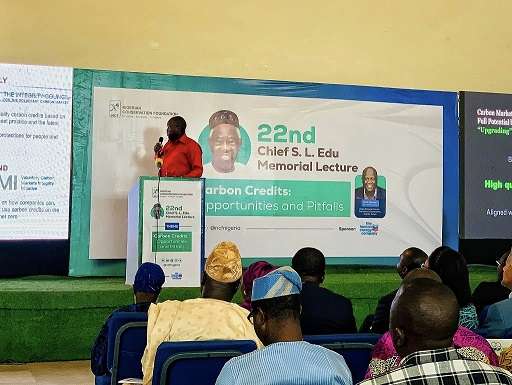The Nigerian Conservation Foundation (NCF) have called for the restructuring of the Carbon Credits Market as a Growth enabler to enhance Sustainable Climate Action in Nigeria.
This call was made at the 22nd Late Chief S.L Edu Annual Lecture which held yesterday, May 28, 2024.
The lecture, organized and sponsored by NCF and Chevron Nigeria respectively, is a memorial to the late founder of NCF, Late Chief S.L Edu, and has become over the years, an avenue to expand participants knowledge base on environmental issues.
This year’s lecture focused on carbon opportunities and pitfalls.
Giving his opening remarks, Hon. Justice R.I.B Adebiyi, Chairman NEC of NCF, set the atmosphere by calling on the Nigerian Government, the business community and individuals to make responsible choices by adopting sustainable practices such as reducing carbon footprints, protecting natural habitats and phasing out single use plastics.
“It is important that we pause and reflect on how we can individually and collectively commit to and make a positive impact and difference to numerous and interrelated environmental issues”. enjoined Justice Adebiyi.
All these climate focused interventions can be aided by the development of a uniform carbon credit system”, says Dr Kevin Juma, “and creating widespread awareness of what constitutes carbon credit”.
Dr Juma, Guest Lecturer and Africa Climate Director at The Nature Conservancy, explained that Carbon Credits are certificates earned either for reducing emissions or avoiding emissions.
“It is a one time certificate that represents emissions reduction and avoidance tradeable in a market place known as the Carbon Market”.
Dr Juma noted that there are various methods of reducing emissions, most common of which are the Nature based solutions where you have afforestation and conservation and the technology based solution where you have interventions such as renewable energy.
“The opportunities in the credit market are massive”, says Juma.
“Africa should rightfully play a far bigger role in the global carbon market, reflecting it’s significant contribution to mitigating the effects of climate change.
“As a continent, Africa has untapped natural resources which constitute 20% of the World’s forests.
He however noted the need for awareness, stating that while planting trees could earn carbon credits, certificates couldn’t be awarded for naturally grown forests sited in a particular location.
To earn carbon credit on forests, there must be some extra efforts expended which have helped to increase emissions reduction capability and those are the efforts that would be calculated.
The carbon expert noted still that there needs to be a melting point to ensure that calculations have a global standard.
“It is imperative that we understand the possible impact of the carbon market on climate change mitigation and environmental sustainability in Nigeria, says Dr Joseph Onoja, Director General of the NCF.
“From Transportation to Manufacturing, from Agriculture to Renewable Energy, we need to look at how different sectors can help in emissions reduction”.
Dr Onoja stated that Nigeria needs to strictly implement its Nationally Determined Contributions (NDCs) and the country needs it’s citizenry to be a part of that process.
The Lecture ended with the award of research grants, sponsored by Chevron Nigeria, to two PhD students.







